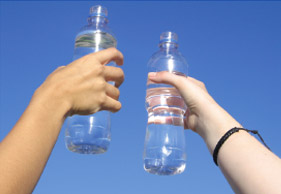New Year’s resolutions are a common thought this time of year. Whatever your goals may be, whether it is starting a running programme, learning to eat more wholesome foods, losing a few kilos or breaking that PB, all these aspirations require continued effort and modifi cation in training and lifestyle. One aspect that should never be overlooked is nutrition, so here are few handy tips to keep in mind this year.
1. BALANCE CALORIE INTAKE AND EXPENDITURE
The amount of calories (energy) you take in should equal the amount you expend, but runners often train in an energydeficient state. Two reasons for this are: running is commonly used for weight control, so we try to limit certain vital nutrients, such as carbohydrates; and runners just don’t eat enough during the day to replace the energy expended during a run.
Unless weight-loss is deemed as appropriate to your health and performance, a constant energy deficit (and thus often a nutrient defi cit) can lead to detrimental effects on energy levels, health and performance. Your goal should be to take in sufficient calories, and if weight-loss is your goal, you should focus on changing the types of calories you take in from unhealthy ones to more energising ones.
2. KEEP HYDRATED
Fluids play an important role in maintaining health and performance during exercise. As athletes exert themselves, the body produces sweat. Air passing over the fluid cools down the skin and underlying blood, which in turn cools down the core of the body, thus regulating body temperature. As the air temperature rises, more sweat needs to be produced, depriving the body of more fl uid, which must be replaced in order to assist in regulating body temperature. Furthermore, sweat consists not only of water but also of vital electrolytes, which need to be replaced when sweat rates are high.
Fluid-loss and electrolyte imbalances can be detrimental to your performance, so here’s a handy guide to how much fluid you should drink to avoid dehydration:
At rest: You need around 20-30ml per kilogram of body weight. If you weigh 55kg, you will need between 1 100ml (four glasses) and 1 650ml (six glasses) per day, whereas a 95kg male will need between 1 900ml (eight glasses) and 2 850ml (11 glasses). Pale-coloured urine is a good sign that you are hydrated, whereas dark yellow urine means you need to drink more water.
During a race: The best way to determine how much to drink is to perform a sweat test to see how much fluid you lose during your runs. Take off all of your clothes (even underwear) and weigh yourself on a scale, then get dressed and go for a run. Immediately after the run, get naked and weigh yourself again. The difference in your weight pre- and post-run will be the amount of fl uid lost during the run. You should not lose more than 0.5kg in body weight after an event or training session. The bottom line is that all runners lose fluids and electrolytes through sweating and must replace them to keep from becoming dehydrated and overheated. It is important that you understand how much fluid you need to replace, to ensure you are getting enough – but not too much – of what you need to stay healthy.
3. GEAR UP ON ANTIOXIDANTS AND PHYTOCHEMICALS
Are you eating enough fruit and vegetables every day? Do you fi nd yourself making excuses like ‘there isn’t enough time’ or ‘they’re too expensive’? This is the year to stop making those excuses. There is no reason that valuable nutrition provided by antioxidants and other phytochemicals should be lacking from
your diet any longer.
As a runner you may need up to three times more antioxidants than the average person to ward off exercise-induced oxidative stress. This is because exercise produces high levels of free radicals, which are unstable oxygen molecules that damage the body and cause fatigue. The best source of these antioxidants, which scavenge free radicals, is fruit and vegetables, so this year, focus on eating three to five servings of fruit and three to five servings of different coloured vegetables per day.
4. USE ALCOHOL SENSIBLY
Alcohol consumed in moderation does not appear to affect performance, provided you consume the right amount of carbs, proteins and fats, as well as adequate fluids, on a daily basis.
However, the immediate side effects of alcohol include dilation of the blood vessels (vasodilation) and depression of the central nervous system. This will cause you to feel fl ushed and leave your senses dulled. Your judgment, co-ordination and vision can be impaired, depending on the quantity you drink and your personal tolerance level. Alcohol is also bad for fl uid replacement, as it
acts as a diuretic, thus hampering your rehydration.
Contrary to what people may believe, alcohol is not good for ‘carbo-loading’ or fuelling up muscle glycogen stores. The kilojoules you get from alcoholic drinks come from the alcohol, not the carbohydrates (which are high in kilojoules), and new research show that alcohol may interfere with glycogen synthesis, meaning that your muscles don’t operate as effi ciently.
The bottom line is that alcohol should not be consumed prior to or during an event, and a post-event celebratory drink should not be used for your important post-event rehydration or refuelling needs. Once you’re rehydrated, a couple of drinks is no problem. Just keep in mind that when it comes to recovery, because of the vasodilatory effect, alcohol can compound tissue damage, potentially causing extra swelling, bleeding and delayed recovery – so drinking alcohol after a hard run or picking up an injury is
the exact opposite of what we are taught to do with ice and elevation of soft tissue injuries.


